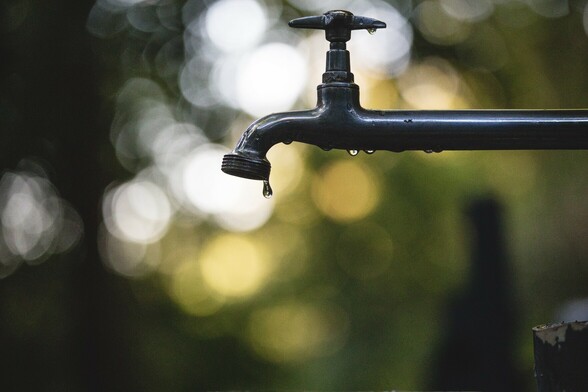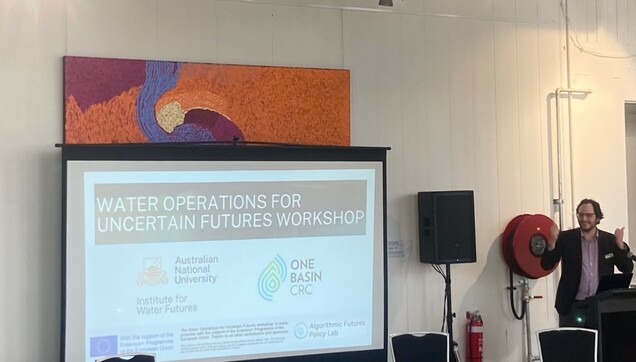Algorithmic Futures Policy Lab · @AlgFuturesLab
33 followers · 41 posts · Server fediverse.auThis afternoon at Water Operations for Uncertain Futures 2023 #AFPLwouf23, we've taken on the role of various stakeholders and mapped out how we might carry out the #water concept pitches from initiation to adaptation. The takeaways? The considerations involved in shaping #water #futures are #complex and involve many interactions between #society, #environment, #technology, #industry, and #governance. Some things are easy to #adapt and #change – but on the whole, creating #robust and #equitable #systems in this space takes time, conversations, many knowledges, hard choices, and careful planning. And whether we know it or not, we all depend on the care people in this space take in creating robust water futures for us all.
#AFPLwouf23 is the third workshop in the Algorithmic Futures Policy Lab series, which has been made possible with the support of the Erasmus+ Programme of the European Union. ANU Institute for Water Futures and #OneBasinCRC have taken the lead in planning and supporting this workshop. Thanks, also, to the Fenner School of Environment and Society, ANU School of Cybernetics, ANU Centre for European Studies, CNRS LAMSADE, and DIMACS Rutgers University.
The content on this post and any material herein reflects only the author’s view. The Education, Audiovisual and Culture Executive Agency and the European Commission are not responsible for any use that may be made of the information it contains.
#cybernetics #futures #waterpolicy #Australia #europeanunion
#afplwouf23 #water #futures #complex #society #environment #technology #industry #Governance #adapt #change #robust #equitable #systems #onebasincrc #cybernetics #waterpolicy #australia #EuropeanUnion
Algorithmic Futures Policy Lab · @AlgFuturesLab
33 followers · 40 posts · Server fediverse.auWhat water futures will we create today?
In Water Operations for Uncertain Futures 2023, we've already seen many possible visions of what our water futures might look like and how we can begin to shape them through #transdisciplinary practice, thanks to yesterday's excellent opening panel chaired by Katherine Daniell, including panelists David Kennewell, Nicola Ulibarri, Karen Hutchinson, Julianne Quinn, and Jasmin Zatarain Salazar from TU Delft. This morning, we're hearing the concept pitches we'll be working on collectively today -- each of which is an opportunity to shape our water futures with help from the knowledges of all our workshop participants.
More on the workshop: https://algorithmicfutures.org/wouf23
#AFPLwouf23 is the third workshop in the Algorithmic Futures Policy Lab series, which has been made possible with the support of the Erasmus+ Programme of the European Union. ANU Institute for Water Futures and OneBasinCRC have taken the lead in planning and supporting this workshop. Also thanks to the ANU Fenner School, ANU School of Cybernetics, ANU Centre for European Studies, CNRS LAMSADE, and DIMACS Rutgers University.
The content on this post and any material herein reflects only the author’s view. The Education, Audiovisual and Culture Executive Agency and the European Commission are not responsible for any use that may be made of the information it contains.
#cybernetics #futures #waterpolicy #Australia #europeanunion
Image credit: Luis Tosta from Unsplash
#transdisciplinary #afplwouf23 #cybernetics #futures #waterpolicy #australia #EuropeanUnion
Algorithmic Futures Policy Lab · @AlgFuturesLab
33 followers · 40 posts · Server fediverse.au#AFPLwouf23 We're hearing about all the #water concept pitches we'll be working on today -- it'll be fantastic to see how all our ideas come together to help shape the #future of water operations! More on the workshop here: https://algorithmicfutures.org/wouf23
Image credit: Luis Tosta from Unsplash
Kathy Reid · @KathyReid
3396 followers · 1914 posts · Server aus.socialIf your #research interests are #water or #WaterFutures, then you might want to follow #AFPLwouf23 for the @AlgFuturesLab workshop - https://algorithmicfutures.org/wouf23
#research #water #waterfutures #afplwouf23
Algorithmic Futures Policy Lab · @AlgFuturesLab
31 followers · 39 posts · Server fediverse.au#AFPLwouf23 panelist Julianne Quinn “There are always tradeoffs. How do we manage the system for total societal benefit?” Her point is that there is no one answer to this question because there are many visions for what “total societal benefit” looks like.
Algorithmic Futures Policy Lab · @AlgFuturesLab
31 followers · 38 posts · Server fediverse.au#AFPLwouf23 panelist Karen Hutchinson on the importance of #transparency in decision-making around what happens in extreme situations (drought, or flood). Very relevant – both for policy making, but also for algorithmic design of relevance to these systems.
Algorithmic Futures Policy Lab · @AlgFuturesLab
31 followers · 37 posts · Server fediverse.au#AFPLwouf23 panelist Jasmin Zatarain Salazar stressing the importance of building common vocabulary to enable effective cross-disciplinary collaborations: “Spaces like this one are very useful for this because we can find common terms.”
Algorithmic Futures Policy Lab · @AlgFuturesLab
31 followers · 36 posts · Server fediverse.au#AFPLwouf23 panelist @Dave Kennewell on communication of uncertainty as a challenge in building trust with stakeholders. How do we explain uncertainty in modelling while also building trust in a useful model?
Algorithmic Futures Policy Lab · @AlgFuturesLab
31 followers · 35 posts · Server fediverse.au#AFPLwouf23 panelist Nicola Ulibarri raising the idea that “uncertainty” isn’t just about water uncertainty – it’s also about the social, political, economic uncertainties that impact on operations.
Algorithmic Futures Policy Lab · @AlgFuturesLab
31 followers · 34 posts · Server fediverse.au“What water operations future could we build together?”
Joseph Guillaume
of
ANU Institute for Water Futures,
ANU Fenner School and OneBasinCRC kicking off #AFPLwouf23 https://algorithmicfutures.org/wouf23


